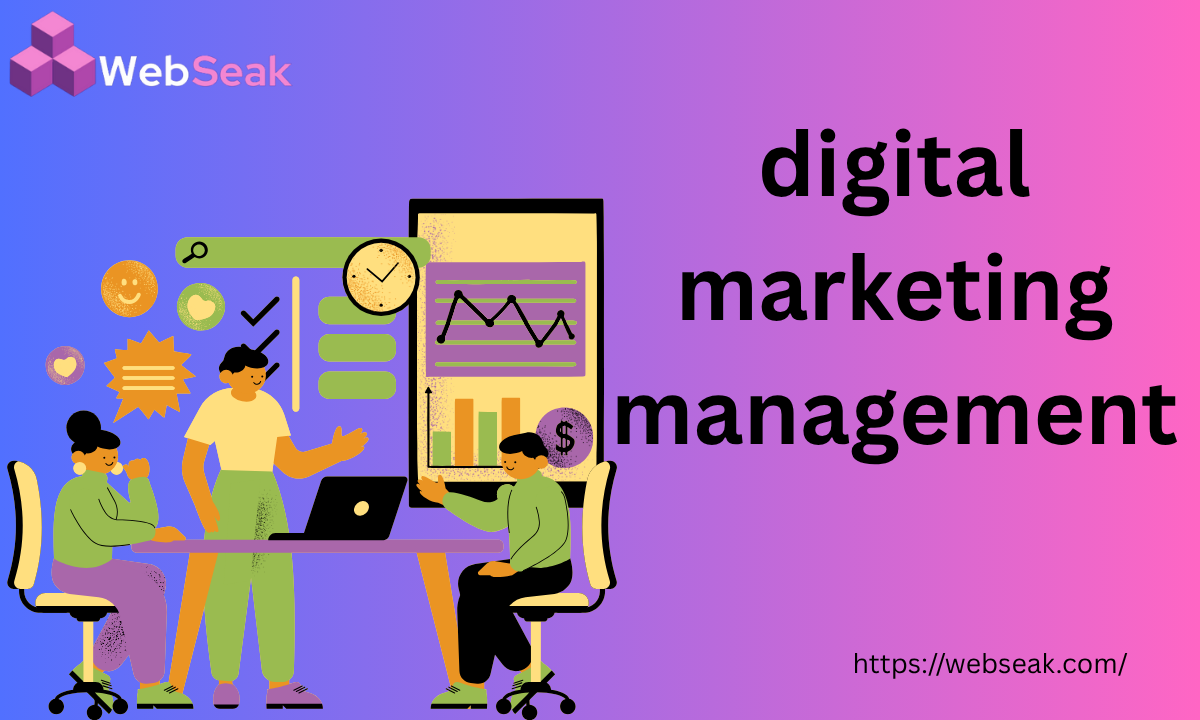
Introduction
Digital marketing management is the process of planning, organizing, executing, and monitoring online marketing activities to help businesses build visibility, engage audiences, and achieve growth. At Webseak we believe that strong management is what transforms digital strategies into measurable results. With so many online platforms, tools, and tactics available today, businesses need an organized approach to manage their marketing efforts efficiently and ensure every campaign contributes to long-term success.
In this article, we’ll explore what digital marketing management means, why it’s crucial for modern businesses, the key components involved, and how brands can implement an effective management strategy to stay competitive in the digital world.
Table of Contents
What Is Digital Marketing Management ?
Digital marketing management refers to overseeing all aspects of a company’s online marketing strategy. It includes managing websites, social media channels, SEO, paid advertising, email campaigns, and analytics to ensure all efforts work together toward a common goal.
A digital marketing manager is responsible for creating strategies, coordinating teams, analyzing data, and ensuring campaigns run efficiently and deliver high returns on investment. In short, digital marketing management is about connecting creativity, technology, and data to achieve business growth.
Importance of Digital Marketing Management
The importance of digital marketing management lies in its ability to bring structure and clarity to an otherwise complex field. Without proper management, marketing efforts can become scattered and ineffective.
Here’s why digital marketing management is essential:
- Strategic Alignment: Ensures all marketing channels and campaigns support overall business objectives.
- Resource Optimization: Allocates time, budget, and people efficiently.
- Data-Driven Decisions: Uses analytics to guide strategy and improve performance.
- Brand Consistency: Maintains a unified voice and identity across all digital platforms.
- Improved ROI: Tracks performance metrics to maximize returns and reduce wasted spending.
At Webseak we emphasize that good management is not just about execution — it’s about strategic direction and continuous optimization.
Key Components of Digital Marketing Management
Digital marketing management covers a wide range of disciplines. Each component plays a vital role in achieving overall marketing success.
1. Search Engine Optimization SEO
SEO ensures your website appears in search results for relevant keywords. Managing SEO involves on-page optimization, backlink building, and technical improvements to drive organic traffic.
2. Pay-Per-Click Advertising PPC
PPC management focuses on running paid ads through platforms like Google Ads, Bing, or Meta Ads Manager. Proper budget allocation, keyword targeting, and performance monitoring are key parts of management.
3. Social Media Marketing
Managing social media involves creating strategies, scheduling posts, engaging with followers, and analyzing metrics. Each platform — from Instagram to LinkedIn — requires a unique approach.
4. Content Marketing
Content management includes creating and distributing valuable articles, videos, and infographics that attract and educate audiences. Consistent and relevant content builds authority and trust.
5. Email Marketing
Email campaign management involves list segmentation, content creation, automation, and performance tracking to nurture leads and improve customer retention.
6. Web Analytics
Analytics management ensures all campaigns are measured and optimized using data. Tools like Google Analytics and Search Console help identify what works and what doesn’t.
7. Conversion Rate Optimization CRO
CRO management focuses on improving website elements — such as landing pages and CTAs — to convert more visitors into customers.
Steps in Effective Digital Marketing Management
At Webseak, we follow a structured process for managing digital marketing that helps businesses achieve consistent results.
Step 1: Research and Goal Setting
The first step involves analyzing market trends, competitors, and customer behavior. Clear objectives such as lead generation, sales growth, or brand awareness are established.
Step 2: Strategy Development
A comprehensive digital marketing plan is created outlining which channels, tools, and techniques will be used to achieve goals.
Step 3: Campaign Execution
Teams implement strategies across SEO, PPC, social media, and content marketing. Collaboration and timely execution are key at this stage.
Step 4: Monitoring and Analysis
Every campaign is tracked through analytics tools to measure success and identify areas for improvement.
Step 5: Optimization and Reporting
Based on insights, adjustments are made to improve future performance. Regular reports keep stakeholders informed and accountable.
Role of a Digital Marketing Manager
A digital marketing manager plays a central role in digital marketing management. This professional acts as the link between creative teams, technical experts, and business leaders.
Core Responsibilities Include:
- Developing digital marketing strategies aligned with business goals.
- Managing teams handling SEO, social media, and advertising.
- Overseeing budgets and timelines for marketing campaigns.
- Measuring KPIs such as website traffic, leads, and conversions.
- Coordinating content creation and brand messaging.
- Staying updated on digital trends and emerging tools.
An effective manager combines analytical thinking with creative vision to guide the brand toward success.
Benefits of Strong Digital Marketing Management
1. Better Decision-Making
When marketing activities are well-managed, decisions are based on accurate data rather than guesswork.
2. Consistent Growth
Effective management ensures ongoing optimization and scalability, leading to sustainable business growth.
3. Cost Efficiency
A well-structured management process prevents overspending and ensures budgets are used wisely.
4. Improved Collaboration
Management brings different teams — such as designers, content creators, and analysts — together under one strategy.
5. Clear Accountability
Defined roles and KPIs ensure everyone knows their responsibilities and performance expectations.
Tools Used in Digital Marketing Management
Digital marketing management relies on a variety of tools to plan, execute, and measure campaigns. Some of the most popular include:
- Google Analytics – for traffic and conversion tracking
- SEMrush or Ahrefs – for SEO analysis and keyword research
- Hootsuite or Buffer – for managing social media accounts
- HubSpot – for email and customer relationship management
- Google Ads – for managing paid ad campaigns
- Trello or Asana – for project and team collaboration
Using the right tools enhances efficiency and ensures data accuracy.
Challenges in Digital Marketing Management
While digital marketing management offers many benefits, it also comes with challenges.
1. Constantly Changing Algorithms
Search engines and social platforms frequently update their algorithms, affecting visibility and performance.
2. Managing Multiple Channels
Balancing multiple platforms requires careful coordination and time management.
3. Data Overload
With so much data available, identifying meaningful insights can be difficult.
4. Budget Constraints
Smaller businesses often struggle to allocate sufficient budgets for all marketing activities.
5. Measuring ROI
Determining the exact impact of certain campaigns on revenue can be complex.
At Webseak, we help businesses overcome these challenges with data-driven strategies and continuous optimization.
Future of Digital Marketing Management
The future of digital marketing management will be shaped by artificial intelligence, automation, and personalization.
- AI and Machine Learning: These technologies will make data analysis and targeting more efficient.
- Automation Tools: Marketers will use advanced software to streamline repetitive tasks.
- Voice and Visual Search: Management strategies will evolve to include voice commands and image-based searches.
- Personalization: Customizing user experiences will become even more important for engagement.
Businesses that adapt early to these changes will stay ahead in the digital landscape.
How Webseak Approaches Digital Marketing Management ?
At Webseak, our approach to digital marketing management focuses on clarity, creativity, and measurable impact. We help brands:
- Build comprehensive digital strategies that align with goals.
- Optimize campaigns across all channels.
- Use analytics to track, measure, and improve performance.
- Maintain brand consistency and creative storytelling.
- Drive sustainable growth through innovation and smart management.
Our mission is to make digital marketing simpler, smarter, and more effective for every business we partner with.
Conclusion
Digital marketing management is the foundation of successful online business growth. It brings structure, direction, and measurable results to your digital efforts. From planning campaigns to analyzing performance, effective management ensures that every digital activity contributes to achieving your goals.
At Webseak we believe that great marketing requires both creativity and discipline. By combining strategic management with innovative execution, businesses can reach the right audience, increase engagement, and build long-term success in the digital era.
Whether you’re a small startup or a global enterprise, mastering digital marketing management is the key to staying competitive in today’s fast-changing world.


